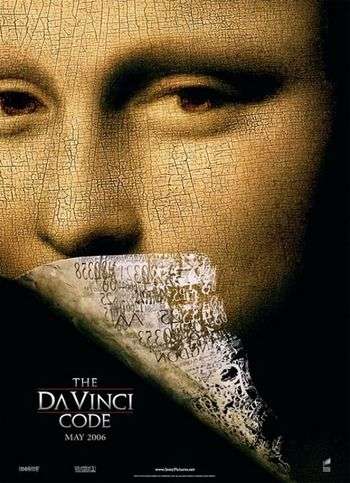The Da Vinci Code

The Da Vinci Code is a 2003 thriller written by Dan Brown. It sold 80 million copies worldwide, becoming one of the bestselling novels in history. It also caused a huge controversy because of its statements about early Christianity, and was sharply criticized for historical inaccuracy. In 2006, a film adaptation was released.
The story begins with a museum curator getting killed, setting a historian framed for the murder and his newfound lady co-investigator on a puzzle quest for the Holy Grail.
Tropes used in The Da Vinci Code include:
- Ancient Conspiracy: Subverted. Just like in Angels & Demons, it turns out to be the work of a lone nutjob with an agenda. All the power players seemingly acting in concert against our heroes turn out to be unassociated individuals merely acting on poor information.
- Ancient Tradition: The Priory of Sion.
- Adventurer Archaeologist: Sort of; Adventurer Symbologist (a
made updiscredited discipline) in this case - Author Catchphrase: "My friends..."
- Beethoven Was an Alien Spy: Leonardo was part of a ancient group that knew the secret of Jesus' hidden legacy.
- Bilingual Bonus: Aringarosa is Italian for "Red Herring", indicating he isn't the Big Bad.
- Book Ends: The story begins and ends with a dead body in the Louvre. The first time it's Jacques Saunière's body. The second time it's the corpse of Mary Magdalene, whose tomb was hidden under the Louvre by the Priory of Sion.
- Chekhov's Gun: Using planks as parachutes.
- Claustrophobia: Langdon. He is on every book.
- Dan Browned: Helped inspire the trope.
- Driving Stick: Langdon's inability to do this briefly delays a getaway.
- Eureka Moment: Saturated with them, the final one is unseen but heavily implied.
- Evil Albino: Silas. As inaccurate as the portrayal of albinism is, the use of the trope is arguably justified. Silas' father was an alcoholic thug who abused his son because of his freakish appearance, forcing Silas to run away from home as a teenager and turn to crime to survive. He's not an evil hitman because of his albinism, but it's understandable that his treatment might lead to some unsavory career choices.
- Fantastic Catholicism
- Fleur-de-Lis
- Follow the Leader: Created an explosion of Ancient Conspiracy quests *cough* National Treasure *cough* and books about the Holy Grail. Also, this was was inspired by a "nonfiction" book which is about a conspiracy theory similar to the one Langdon runs into.
- Hollywood Law: Dan Brown seems to be under the impression that all it takes to extradite a British national from their own country is for a foreign law enforcement agent to make a call to a local police officer. Also he seems to think that said local police will simply detain the suspects until the foreign police arrive to make the arrests themselves.
- Inspector Javert: Bezu Fache
- Knight Templar: The original Knights Templar figure heavily in the Ancient Conspiracy Alternate History of the book. Ironically, practically all the antagonists of the book also follow this trope, being extremely moral Anti-Villains, Well Intentioned Extremists, or just badly misinformed. This is most evident in the Teacher, Sir Leigh Teabing, a Knight of the British Empire who also sees himself as furthering the good works of the original Knights Templar.
- Linked-List Clue Methodology: The cryptex; a moderately clever way to protect a secret message - basically a combination lock with a vial of vinegar to destroy the encased papyrus should one attempt to open it without the password(s).
- Never a Self-Made Woman: a very good example of it, at that.
- Parallel Porn Titles: The Da Vinci Load. Currently on the second installment.
- The Da Vinci Co-Ed is another one.
- Plot-Powered Stamina: Robert Langdon never sleeps or visits the bathroom in the book, until the end
- Poirot Speak: Dan Brown's foreign language dialogue is almost unmatched in how ham-handed and unrealistic it is. Almost every bit of dialogue by a French person (and the first part of the book is set in Paris) features one or two words of French in otherwise flawless English, and it's almost always a simple, common word. In real life, people speaking a language that is foreign to them would probably lapse into their native tongue for the unfamiliar or unknown words, not "mister" and "captain".
- Too Dumb to Live: Many people were appalled at the sheer stupidity of the officer who let Langdon and Sophie, the former a suspected murderer and the latter his accomplice, get away for fear of damage to the Madonna on the Rocks.
- Red Herring: As in all Dan Brown books, but literally in this case:"Aringarosa" is Italian for...you guessed it.
- Rewarded as a Traitor Deserves: Remy Legaludec. If it weren't for that allergy, he could have gotten away with it all.
- Self-Destructing Security: The cryptex protects its contents with a combination lock. Attempting to force the cryptex open will break the vial of vinegar inside, which would dissolve the papyrus along with its message before it could be read. As a result, only the right password will grant access to the message.
- Shout-Out: Dan Brown names a main character, Leigh Teabing, anagrams of the names of the author of that "nonfiction" grail book.
- Trend Covers: Many, many historical/religious/conspiracy thriller novels got similar covers after this one's success.
- Well-Intentioned Extremist: Silas, again. Also Leigh Teabing.
This article is issued from Allthetropes. The text is licensed under Creative Commons - Attribution - Sharealike. Additional terms may apply for the media files.